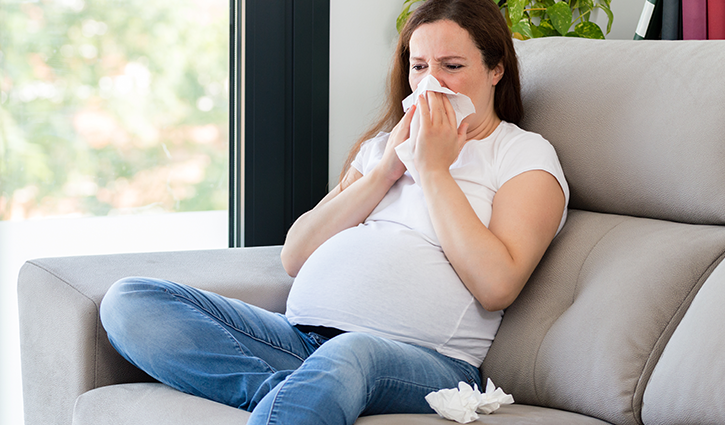

Hay fever affects nearly 1 in 5 Australians, and if you’re one of those (not-so-lucky) people, you might find that you become more sensitive to it during pregnancy. The reasons for this are unclear, but it’s thought to be due to hormonal changes (isn’t everything!).
Symptoms of hay fever include sneezing, an itchy, runny or blocked nose, and watery or itchy eyes. You may have seasonal hay fever at certain times of the year when allergens are in the air, such as pollen from trees and grasses; or, you might experience it year-round with triggers that could be household allergens, including dust mites or moulds.
While hay fever itself is not harmful to your unborn baby, no one wants to experience those unpleasant symptoms during pregnancy when there’s already so much going on in the body, and you’re struggling to sleep as it is.
Always talk to your GP or pharmacist before taking any hay fever medication since some can affect your baby. There are allergy medicines that are safe, including some (but not all, particularly those that make you drowsy) antihistamines, eye drops, and nasal sprays.
However, to reduce your need for medications, here is what you can do to cope with hay fever during pregnancy.
Coping with hay fever during pregnancy
- Avoid any known triggers or allergens
This isn’t always possible, especially if you’re unsure of what you’re allergic to. Stay indoors on windy days or when the pollen count is high (you can check that here for example). Use recirculated air in the car, and avoid activities or locations where you might be exposed to allergens, such as mowing the grass.
- Wash off any pollens
If pollen is a trigger for you, and you’ve been outdoors, have a shower and change your clothes as soon as you can.
- Use a saline nasal spray
If your nose is congested, a saline spray or drops can bring some natural relief.
- Protect your nose from allergens
Dab some coconut oil around your nostrils to trap the pollens before entering your nasal passages. The best time to do this is before you head outside or go to bed.
- Boost your Vitamin C
Oranges, kale, and red capsicum are all good sources of Vitamin C, which is a known antihistamine and antioxidant, so ensure you’re eating some each day (if you can stomach them).
- Increase your daily intake of garlic, onions, and chilli.
Garlic and onion can boost your body’s immune system, but they also act as a natural decongestant, are antiinflammatory, and good sources of a natural antihistamine. Chilli is great at clearing those nasal passages!
- Eat local honey regularly
You’ll not only be supporting your local beekeeper, but it is thought that consuming a teaspoon of honey each day can help to build up a tolerance to local pollen.
- Soothe itchy, puffy eyes
Use a cool compress by soaking a washcloth in a bowl of ice and water and applying it to your eye area regularly.
When to see a doctor
If you don’t have a history of allergies or hay fever and suddenly find that you’re experiencing symptoms, see your doctor to check for other causes. Equally if you’re concerned about your lack of sleep that it may be causing.
There is another common condition known as pregnancy rhinitis. The symptoms are similar to hay fever (also known as allergic rhinitis), but it is not associated with an allergic trigger and it may feel like you’re getting a cold. Your GP will be able to distinguish it from other conditions, such as infections or hay fever during a routine visit.
People with allergies are more likely to have asthma, and symptoms can include wheezing, a persistent cough (especially at night), shortness of breath, and chest tightness. If you’re experiencing any of these, ask your doctor if it could be asthma.
Hay fever should not cause significant breathing problems, so seek medical advice immediately if your chest feels tight, you can’t get enough air, you’re breathless, or feel like you’re suffocating.
Call an ambulance immediately if you have any unexplained breathing difficulties, particularly if they’re severe or come on suddenly.
Can babies get hay fever?
Yes, then can unfortunately. Symptoms are much the same as an adult’s, but they could be mistaken for a cold or congestion, so it’s always best to have your baby checked by your doctor. There is a strong genetic link for hay fever in families, which raises their chances of developing it.























